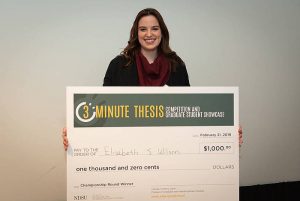05 Mar Student bee researcher wins Three Minute Thesis competition

NDSU biological sciences doctoral student Elisabeth S. Wilson won the fifth annual Three Minute Thesis Competition Feb. 21. The event highlights graduate student research.
Biological sciences doctoral student Elisabeth S. Wilson has been named the winner of NDSU’s fifth annual Three Minute Thesis Competition Feb. 21. The event, which highlights graduate student research, is hosted by the College of Graduate and Interdisciplinary Studies.
Wilson presented “Micro-climate Impacts Nesting Choice and Success of Alfalfa Leafcutting Bee,” in which she explained how temperature within nesting boxes can greatly affect the bee population. Her research found that by facing the boxes to the northeast rather than the southeast can mean earlier nesting for the bees and more offspring, ultimately saving farmers money. Her faculty adviser in the research is Julia Bowsher, associate professor of biological sciences.
Wilson receives the $1,000 grand prize. She described the competition as exciting and beneficial.
“I’ve gained the ability to think about my research differently. I like being able to present to a large group of people about what I find important in the big picture – that’s the best part of the Three Minute Thesis,” said Wilson, who is from Indianapolis and is the daughter of Keith and Laura Wilson of Carterville, Illinois. “My first draft, what I thought was the bare minimum, was nine minutes long. Cutting it down to three minutes was a real challenge.”
Wilson will advance to the Western Association of Graduate Schools regional competition in Tucson, Arizona.
The competition began with 57 contestants giving presentations in eight preliminary rounds. The winner of those rounds moved on to the finals.
Other finalists included:
• Mohsen Tahmasebi Nasab, Fargo
Civil and environmental engineering
“How Do Climate-driven Changes Affect Our Water Resources?”
Adviser: Xuefeng Chu, professor of civil and environmental engineering
• Priyanka Swami, Indore, India
Pharmaceutical sciences
“Combination Therapy for Pancreatic Cancer Treatment”
Adviser: Estelle Leclerc, associate professor of pharmaceutical sciences
• Pranothi Mulinti, Hyderabad, India
Pharmaceutical sciences
Silk Bubbles to the Rescue
Adviser: Amanda Brooks, assistant professor of pharmaceutical sciences
• Alireza Rahimi, Herat, Afghanistan
Coatings and polymeric materials
“Developing of Marine Coatings to Combat Biofouling”
Adviser: Dean Webster, professor and chair of coatings and polymeric materials
• Raquib Hasan, Savar, Bangladesh
Pharmaceutical sciences
“Putty that Treats Bone Infection”
Adviser: Amanda Brooks, assistant professor of pharmaceutical sciences
• Sakshi Taneja, Rajpura, India
Pharmaceutical sciences
“Evaluating the Critical Role of Receptor of Advanced Glycation Endproducts (RAGE) in Pancreatic Cancer”
Adviser: Estelle Leclerc, associate professor of pharmaceutical sciences
• Matthew Confeld, Howard Lake, Minnesota
Pharmaceutical sciences
“Hypoxia Responsive Peptide Conjugated Nanoparticles for Treatment of Solid Tumors”
Adviser: Sanku Mallik, professor of pharmaceutical sciences
Preliminary round winners received a $250 prize.
“All of our contestants did a fabulous job,” said Brandy A. Randall, associate dean of the College of Graduate and Interdisciplinary Studies and professor of human development and family science. “This really showcases the quality research our graduate students are doing and we’re proud of them.”
The recipient of the People’s Choice Award for the competition was civil engineering student Mohsen Tahmasebi Nasab.
The competition was held in conjunction with the Graduate Student Showcase held in the Memorial Union Ballroom.
The Showcase People’s Choice for Best Poster went to Ana Magallanes (co-authors Frank Manthey and Senay Simsek) for “Has Wet Milling an Impact on Starch and Gluten Fractions?” Magallanes’ faculty adviser is Senay Simsek, professor of plant sciences.
The Showcase People’s Choice for Best Display went to Kutay Yilmaz for “Grain Sorghum can be a Viable Alternative Crop for North Dakota.” Yimaz’s adviser is Burton L. Johnson, professor of plant sciences
Australia’s University of Queensland developed the first Three Minute Thesis competition in 2008, and the concept has spread to institutions around the world. More than 600 universities in more than 65 countries now hold competitions.
As a student-focused, land-grant, research university, we serve our citizens.


